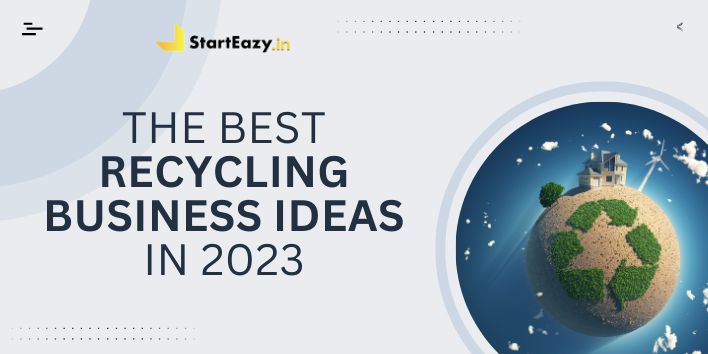The Best Recycling Business Ideas in 2023 | Sustainable Startups

With environmental consciousness on the rise, the recycling industry has become a beacon of hope for a sustainable future. In fact, as entrepreneurs embrace eco-friendly practices to contribute to the well-being of our planet, the demand for recycling business ideas is stronger than ever.
If you are passionate about environmental conservation and looking to start a business that makes a positive impact, consider these innovative recycling business ideas.
E-waste Recycling
Minimum Average Investment: Rs. 10 to 15 lakhs
Electronic waste (e-waste) has become a pressing environmental issue as technological advancements lead to the rapid obsolescence of electronic devices.
E-waste contains hazardous materials such as lead, mercury, and cadmium, posing serious health and environmental risks if not disposed of properly.
Starting an e-waste recycling business like Cashify involves setting up collection centres where individuals and businesses can drop off their old electronic devices.
Upon receiving the e-waste, the recycling process begins with dismantling the devices to extract valuable components and metals.
These recovered materials can then be sold to manufacturers, reducing the need for virgin resources.
Simultaneously, the proper disposal of hazardous components ensures they do not end up in landfills or cause pollution.
Entrepreneurs in this field need to understand regulations related to hazardous waste management, obtain necessary permits, and implement safe recycling practices.
Additionally, building partnerships with local businesses, municipalities, and electronics manufacturers can help secure a steady supply of e-waste for recycling.
Organic Waste Composting
Minimum Average Investment: Rs. 5 to 8 lakhs
Organic waste, such as food scraps and yard trimmings, makes up a significant portion of municipal waste.
When disposed of in landfills, organic waste produces methane, a potent greenhouse gas.
Therefore, composting is an effective solution to address this issue and create nutrient-rich compost for agricultural use.
To start an organic waste composting business like Bhuyantra, entrepreneurs need to identify potential sources of organic waste, such as:
- restaurants
- households
- agricultural farms
Setting up composting facilities or partnering with existing composting facilities is essential for processing the waste effectively.
The compost produced can be sold to farmers, nurseries, and gardening centres, providing a sustainable alternative to chemical fertilizers.
Additionally, educating the community about the importance of composting and providing composting services can increase awareness and participation in waste reduction efforts.
Plastic Recycling
Minimum Average Investment: Rs. 15 to 20 lakhs
Plastic pollution is one of the most pressing environmental challenges, with vast amounts of plastic waste entering the oceans and landfills each year.
Starting a plastic recycling business involves establishing collection points for plastic waste, which can be sourced from households, businesses, and waste management agencies.
Once collected, the plastic waste goes through a sorting and cleaning process to remove impurities and contaminants.
Different types of plastic are then processed separately, either through mechanical recycling or advanced methods like pyrolysis and chemical recycling.
These processes transform plastic waste into reusable materials, such as plastic pellets or fibres.
Entrepreneurs in this field should be familiar with different types of plastics, their recycling codes, and the market demand for recycled plastic products.
In fact, building partnerships with manufacturers and industries that use recycled plastics can ensure a consistent market for recycled materials.
Textile Recycling
Minimum Average Investment: Rs. 8 to 12 lakhs
The fashion industry's fast-paced nature leads to significant textile waste generation.
Much of this waste ends up in landfills, contributing to environmental degradation.
A textile recycling business aims to tackle this issue by repurposing old clothing and fabrics to reduce waste.
For this purpose, entrepreneurs can collect used clothing from donation centres, and thrift stores, or partner with fashion retailers to gather unsold or returned items.
After that, sorting textiles based on their condition and material type is crucial for efficient recycling.
The textiles can then be processed into new products through techniques like shredding, spinning, or weaving.
Entrepreneurs can explore different markets for their recycled textiles, such as creating upcycled fashion lines, supplying raw materials to manufacturers, or producing eco-friendly home products.
Moreover, engaging with local communities and fashion enthusiasts can help raise awareness about sustainable fashion practices.
Paper Recycling
Minimum Average Investment: Rs. 12 to 18 lakhs
Despite the rise of digitalization, the demand for paper products remains high.
However, paper production relies heavily on virgin wood pulp, leading to deforestation and habitat destruction.
A paper recycling business aims to recover and recycle used paper to reduce the environmental impact of the paper industry.
For this purpose, entrepreneurs can set up collection centres for used paper from offices, schools, and residential areas.
The collected paper is then sorted based on its grade and processed through pulping and de-inking to remove ink and other impurities.
The recycled paper can be used to produce various paper products, including packaging materials, stationery, and tissue papers.
In fact, educating businesses and consumers about the benefits of using recycled paper and promoting sustainable printing practices can increase the demand for recycled paper products.
Also, building partnerships with printing companies and paper manufacturers can help establish a steady supply chain of recyclable paper.
Mobile Recycling Units
Minimum Average Investment: Rs. 7 to 10 lakhs
In remote or underserved areas, access to recycling services may be limited, leading to increased waste accumulation.
A mobile recycling unit can be a practical solution to address this issue.
It can bring recycling services directly to communities that lack access to traditional recycling facilities.
Entrepreneurs can customize mobile units to cater to specific types of recyclable materials, such as plastic, glass, or paper.
These units can travel to different locations regularly or be stationed at specific spots where waste generation is high.
Additionally, entrepreneurs can collaborate with local authorities or community organizations to identify areas where the mobile unit's services are most needed.
Apart from recycling, mobile units can also serve as educational tools, raising awareness about recycling practices and environmental conservation.
Implementing efficient waste segregation and processing systems within the mobile unit is vital to ensure effective recycling while on the move.
Frequently Asked Questions
- What legal requirements do I need to fulfil for registering my recycling business online, and how can StartEazy assist with the process?
To legally register your recycling business online and ensure compliance with all necessary regulations, StartEazy offers comprehensive business consulting and company registration services.
Our expert team will guide you through the entire process, saving you time and effort.
Here's how StartEazy can assist you:
- Entity Selection: We will help you choose the most suitable legal structure for your recycling business, whether it's a sole proprietorship, partnership, limited liability partnership (LLP), or private limited company registration online.
- Documentation: Our team will handle all the required documentation, including preparing and filing the necessary forms and paperwork for your business registration.
- Tax Registration: We will assist you in obtaining the relevant tax identification numbers and ensuring compliance with tax regulations.
- Compliance Check: StartEazy will conduct a thorough compliance check to ensure that your recycling business meets all the legal requirements and regulations applicable to your industry.
- Streamlined Process: By using our online platform, you can avoid the hassles of paperwork and time-consuming procedures, ensuring a seamless and efficient registration process.
With StartEazy's support, you can focus on building your eco-conscious recycling startup while we handle the legal aspects, ensuring your venture starts on the right foot.
Let us take care of the registration process, so you can concentrate on creating a positive impact on the environment through your sustainable business.
- What types of government grants or loans are available to help finance my recycling business?
The availability of government grants and loans for financing recycling businesses can vary depending on your location and the specific focus of your recycling venture.
However, there are several common types of grants and loans that entrepreneurs in the recycling industry may explore:
- Environmental Grants: Support environmentally sustainable businesses, focus on recycling efforts and waste reduction.
- Green Business Grants: Encourage eco-friendly practices and prioritize sustainability.
- Innovation and Research Grants: Fund innovative recycling technologies and methods.
- Small Business Loans: Provide favourable terms to assist startups in the recycling sector.
- Community Development Grants: Benefit local communities through recycling initiatives.
- Industry-Specific Grants: Target specific recycling industries, e.g., electronics, plastics, and organic waste.
- Energy Efficiency and Renewable Energy Grants: Promote sustainable energy usage in recycling businesses.








